Les mazarinades et l’international
Organisé par le Groupe de Recherches Interdisciplinaire sur les Mazarinades (GRIM)
26-28 mars 2025
Appel à communication —Français
**English below**
Les 6 000 libelles parus sous la Fronde ont fait l’objet au cours de ces dernières années de nouvelles approches qui démontrent que les mazarinades dépassent de loin le cadre des affrontements politiques des années 1648-1653 en France ; elles nous conduisent aussi vers d’autres espaces historiques ou politiques, mobilisent des types de discours, des modes langagiers, des genres littéraires, des formes poétiques ou théâtrales, des topiques culturelles contemporaines, dans un processus à double sens : éclairant, en contexte, certains aspects de leur composition et donnant à voir leur instrumentalisation en situation polémique. L’élargissement du questionnement doit beaucoup à l’apport des humanités numériques qui a permis d’élaborer de nouveaux protocoles d’investigation de volumineux corpus.
Raison pour laquelle, après les colloques de Paris (2015), Tokyo (2016), Rouen (2022), le regard se tourne cette fois vers la question de l’internationalité des mazarinades :
Les mazarinades, un horizon transnational –
De nombreux travaux ont permis de formuler des observations et de susciter des interrogations sur les collections de mazarinades à l’échelle internationale. La dispersion des fonds en Europe et au-delà (notamment au Japon, en Russie et aux États-Unis) ne cesse de stimuler le questionnement sur les modalités de leur circulation. Comment s’organise leur diffusion à l’étranger ? Quels sont les milieux et les réseaux par lesquels se met en place leur circulation ? Quels échos ces textes, destinés à un public local, ont-ils pu rencontrer à l’extérieur de la France ? Comment le lectorat étranger les percevait-il ?
Les mazarinades et l’étranger –
On pourra également s’interroger sur la perception de l’international (actualité, étrangers, acteurs, systèmes politiques), qui se révèle au travers des mazarinades. Si celles-ci regorgent de commentaires sur les étrangers présents en France — les cas de Mazarin et d’Anne d’Autriche, protagonistes directs du conflit, sont bien documentés — qu’en est-il des autres individus ou groupes ? Comment ces derniers sont-ils représentés ? Le discours des mazarinades sur les réalités extérieures à l’espace national offre également un grand potentiel d’interrogation : comment ces textes, pourtant très ancrés dans un conflit local, saisissent-ils les événements, proches ou lointains, contemporains de la Fronde ? Quelle influence le contexte des troubles français exerce-t-il sur la narration des conflits qui se déroulent entre pays voisins ou au sein de ceux-ci ? À l’inverse, on pourra également se demander comment la Fronde et les mazarinades sont perçues dans la presse étrangère et dans les correspondances officielles ou privées. De quelle manière les libelles publiés par centaines sont-ils identifiés, collectionnés et commentés ? Vues de l’étranger, les mazarinades sont-elles considérées comme des sources d’information crédible ? Ou bien ne sont-elles que des productions pamphlétaires appréciées pour leurs qualités littéraires ?
Mazarinades et frontières intellectuelles –
La périodisation habituelle suggère souvent un moment de rupture autour de 1650, en se fondant sur la chronologie de la Fronde, les dates de la Révolution anglaise et la fin de la guerre de Trente Ans. À cette frontière temporelle s’en ajoutent d’autres, imposées par les concepts de l’analyse esthétique, à l’instar de celle qu’on a voulu établir entre baroque et classicisme. En outre, les séparations établies entre les disciplines et les pratiques épistémologiques bornent l’étude des mazarinades, en négligeant souvent le fait que l’objet outrepasse ces limitations. Les collaborations ayant cours depuis une quinzaine d’années impliquent surtout des spécialistes en histoire, en littérature, en linguistique et en gestion documentaire. Cet appel tente aussi d’encourager les spécialistes d’autres disciplines à enrichir l’étude des mazarinades de l’apport de leur champ d’expertise.
Le colloque se tiendra à l’Université de Fribourg (Suisse), du 26 au 28 mars 2025. Les communications pourront être présentées en français, en anglais, en allemand ou en italien.
Les propositions de communication d’une vingtaine de lignes (titre, résumé, brève présentation bibliographique) sont à envoyer à l’adresse suivante, avant le 31 janvier 2024 : mazarinades2025@gmail.com
Comité organisateur :
Prof. Claude Bourqui (Dépt. Français, UNIFR, Suisse)
Prof. Claire Gantet (Dépt. Histoire, UNIFR, Suisse)
Prof. Stéphane Haffemayer (Dépt. Histoire, Univ. de Rouen, France)
Mcf Christophe Schuwey (Dépt. Ingénierie du document, Lab. HCTI, Univ. Bretagne Sud, France)
Dr Céline Graillat-Mansuy, (Dépt. Français, UNIFR, Suisse)
Virginie Cogné, doctorante (Dépt. Histoire, UQAM, Canada)
*
* *
Call for papers - English
In recent years, new scholarship about the 6,000 libels published during the Fronde have shown that the mazarinades engage with much more than the sole French political crisis of 1648-1653. These numerous and diverse pamphlets open to other historical or political spaces. They also call for a history of types of discourse, language modes, literary genres, poetic or theatrical forms, and they intervene in contemporary cultural topics in a two-way process: through the study of their composition process in context, and through their instrumentalization in polemical situations. Digital humanities have also brought new questions by enabling the investigation of voluminous corpora. Building on such findings, the conference held in Rouen in September 2022, after the one in Paris (2015) and Tokyo (2016), moved to study the international range of the mazarinades:
Mazarinades as a Transnational Phenomenon -
Many recent studies have allowed us to observe and study the mazarinade collections on an international scale anew. Collections stored in Europe and beyond (especially in Japan, Russia and the United States) fosters new inquiry about documents printed during the Fronde. How were they distributed and disseminated abroad? What circles and networks were involved? What resonance did these texts, intended for a local audience, have outside France? How did foreign readers perceive them?
Mazarinades, Foreign Spaces and Foreigners -
What perception of international matters (current events, foreigners, actors, political systems) do the mazarinades construct? Although the representation of foreigners in France are well-studied — Mazarin and Anne of Austria — what about the representation of other individuals or groups? Mazarinades’ approach to realities outside the French national space also offers great potential for interrogation: how do these texts, despite being rooted in a local conflict, account for events contemporary with the Fronde, near or far from France? What influence does the context of the French troubles exert on the narration of conflicts taking place between or within neighboring countries? Conversely, how was the Fronde perceived in the foreign press, or described in private correspondence? How were these hundreds of libels identified, collected and commented on by foreign readers? Do readers abroad consider Mazarinades a credible source of information, or are they seen as low-value, disposable libels?
Mazarinades Beyond Intellectual Boundaries -
Because of the chronology of the Fronde, the English Revolution and the end of the Thirty Years' War, scholarship tends to set 1650 as an essential turning point in historiography. In addition to this temporal boundary, other concepts, such as aesthetic distinction between Baroque era and Classical era, have assigned the Mazarinades to a specific period instead of acknowledging their importance for the whole second seventeenth century. Finally, disciplinary and epistemological boundaries also confined the study of mazarinades to specific fields, whereas the object itself calls for a multidisciplinary approach. Since collaborations over the past fifteen years have mainly involved specialists in history, literature, linguistics and document management, we very much hope this conference would bring contributions from other fields of expertise.
The conference will be held at the University of Fribourg (Switzerland), from March 26 to 28, 2025. The papers — approximately 30 minutes each — may be presented in French, English, German or Italian.
Submission of approximately 400 words (title, abstract, brief bio-bibliographical presentation)
should be sent to the following address by January 31, 2024: mazarinades2025@gmail.com.
Bibliographie/bibliography :
Carrier, Hubert, La presse de la Fronde (1648-1653) : les mazarinades. La conquête de l’opinion, t. 1, coll. « Histoire et civilisation du livre », Genève : Droz, 1989.
—, La presse de la Fronde (1648-1653) : les mazarinades. Les hommes du livre, t. 2, coll. « Histoire et civilisation du livre », Genève : Droz, 1991.
—, Le Labyrinthe de l’État. Essais sur le débat politique en France au temps de la Fronde (1648-1653), Paris : Honoré Champion, 2004.
—, Les Muses guerrières. Les Mazarinades et la vie littéraire au milieu du XVIIème siècle, coll. « Mélanges de la bibliothèque de la Sorbonne », Paris : Klincksieck, 1996.
Deroux, Maximilien, Les mazarinades dans les collections du Ministère des Affaires Étrangères. Présentation et catalogue, coll. “Archives diplomatiques/Bibliothèque”, ed. Centre des Archives diplomatiques de la Courneuve, 2019.
Duchêne, Roger, Ronzeaud,, Pierre, La Fronde en questions. Actes du dix-huitième colloque du centre méridional de rencontres sur le XVIIème siècle. Marseille 28-29, Cassis 30-31 janvier 1988, Aix-en-Provence : Publications de l’Université de Provence (UP), 1989.
Haffemayer, Stéphane, Rebollar, Patrick, Sordet, Yann (dir.), Histoire et civilisation du livre XII : Mazarinades, nouvelles approches, Genève : Droz, 2016.
Ichimaru, Tadako (éd.), L’Exploration des mazarinades/ マザリナード探求, Tokyo : Projet Mazarinades, 2021.
Jouhaud, Christian, Mazarinades. La Fronde des mots, coll. « Historique », Paris : Aubier-Flammarion, [1985] 2009.
Labadie, Ernest, Nouveau supplément à la bibliographie des mazarinades, Paris : Henri Leclerc, 1904.
Lecestre, Léon, Les mazarinades : conférence faite à l’Institut Catholique de Paris le 3 mars 1913, Paris : Plon, 1913.
Moreau, Célestin, Bibliographie des mazarinades, t.1, A-F, Paris : Jules Renouard, 1850.
—, Bibliographie des mazarinades, t.2, G-Q, Paris : Jules Renouard, 1850.
—, Bibliographie des mazarinades, t.3, R-Z, Paris : Jules Renouard, 1851.
—, « Supplément à la bibliographie des mazarinades », in Bulletin du bibliophile et du bibliothécaire, Paris : J.Techener, 1862, p.786-829.
—, « Supplément à la bibliographie des mazarinades » in Bulletin du bibliophile et du bibliothécaire, Paris : Léon Techener fils, 1869.
Socard, Émile, Supplément à la bibliographie des mazarinades, Paris : Menu, 1876.
Van der Haeghen, Philippe, « Notes biographiques sur les mazarinades », in Bulletin du bibliophile belge, Bruxelles : F.Heussner, librairie ancienne et moderne, 1859.
Walsh, James E., Mazarinades: a catalogue of the collection of 17th century civil war tracts in the Houghton Libraray Harvard University, Boston : G.K. Hall&Co, 1976.

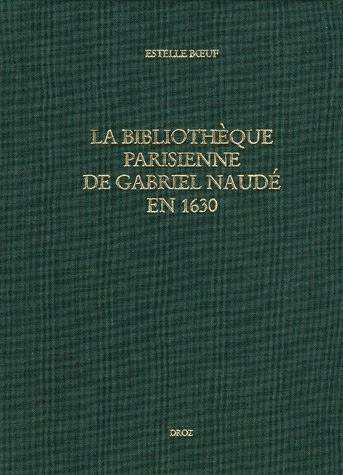 Estelle BOEUF, La Bibliothèque parisienne de Gabriel Naudé en 1630 : Les lectures d'un "libertin érudit", Genève, Droz, 2025.
Estelle BOEUF, La Bibliothèque parisienne de Gabriel Naudé en 1630 : Les lectures d'un "libertin érudit", Genève, Droz, 2025. 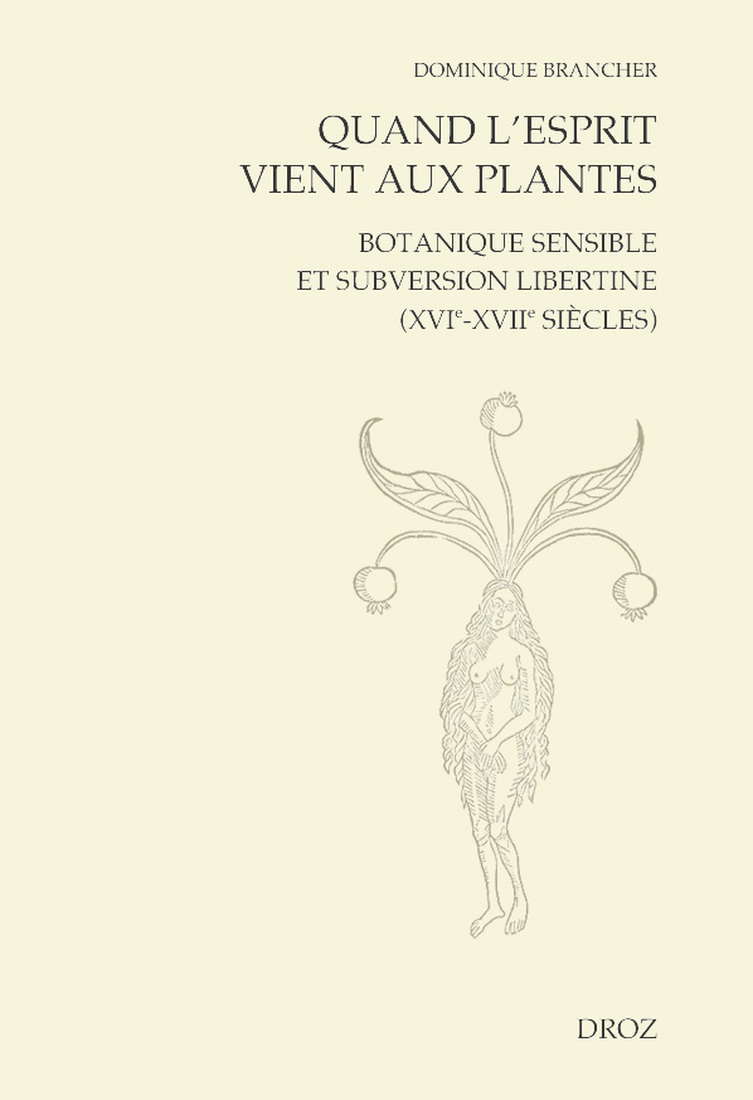 Dominique Brancher, Quand l'esprit vient aux plantes Botanique sensible et subversion libertine (XVIe-XVIIe siècles), Genève, Droz, 2025.
Dominique Brancher, Quand l'esprit vient aux plantes Botanique sensible et subversion libertine (XVIe-XVIIe siècles), Genève, Droz, 2025.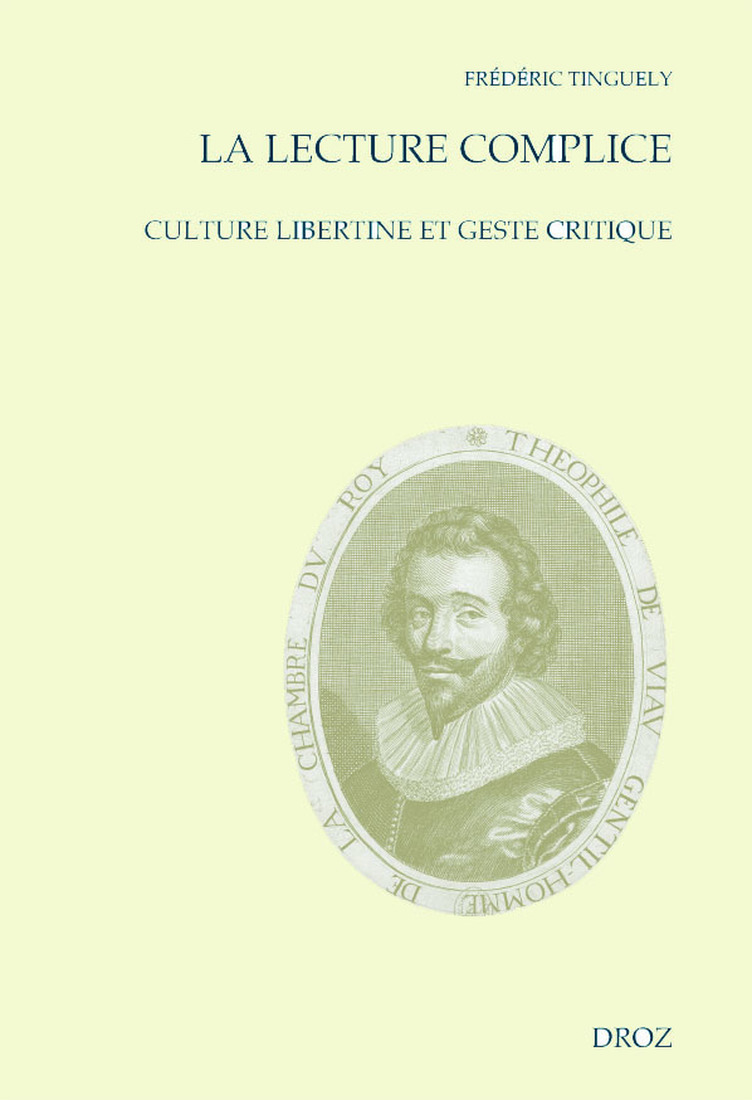 Frédéric Tinguely, La Lecture complice. Culture libertine et geste critique, Genève, Droz, 2025.
Frédéric Tinguely, La Lecture complice. Culture libertine et geste critique, Genève, Droz, 2025.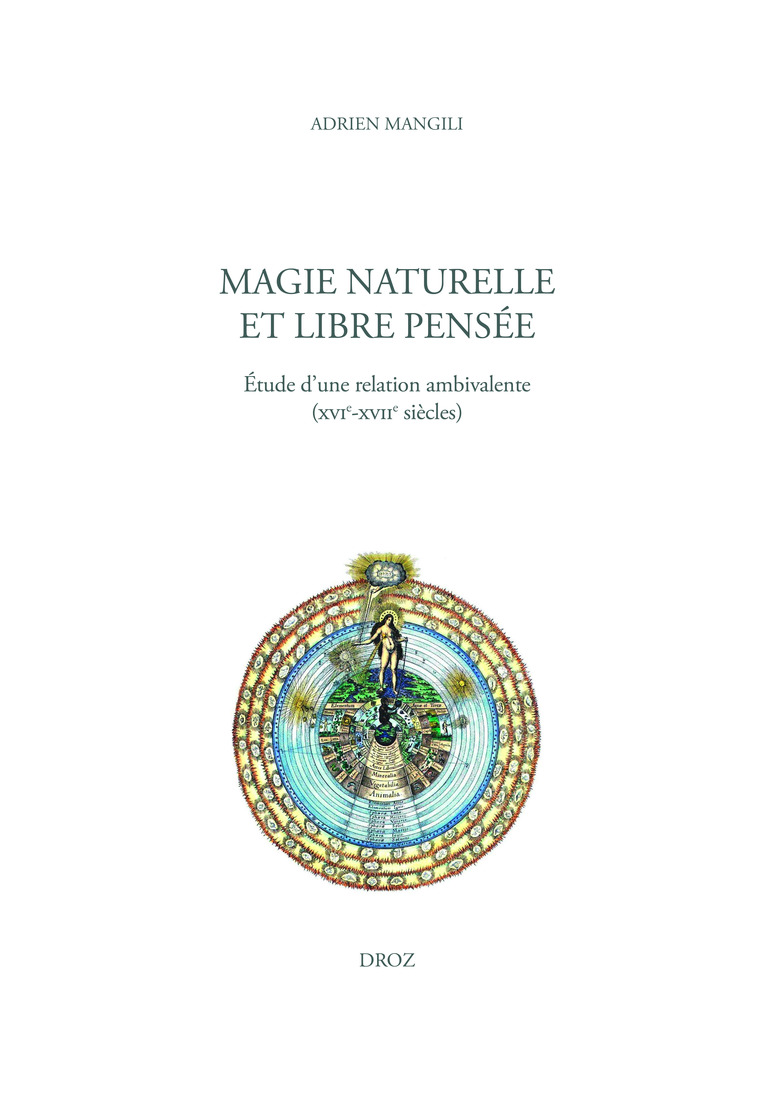 Adrien Mangili, Magie naturelle et libre pensée. Étude d'une relation ambivalente (XVIe-XVIIe siècles), Genève, Droz, 2025.
Adrien Mangili, Magie naturelle et libre pensée. Étude d'une relation ambivalente (XVIe-XVIIe siècles), Genève, Droz, 2025.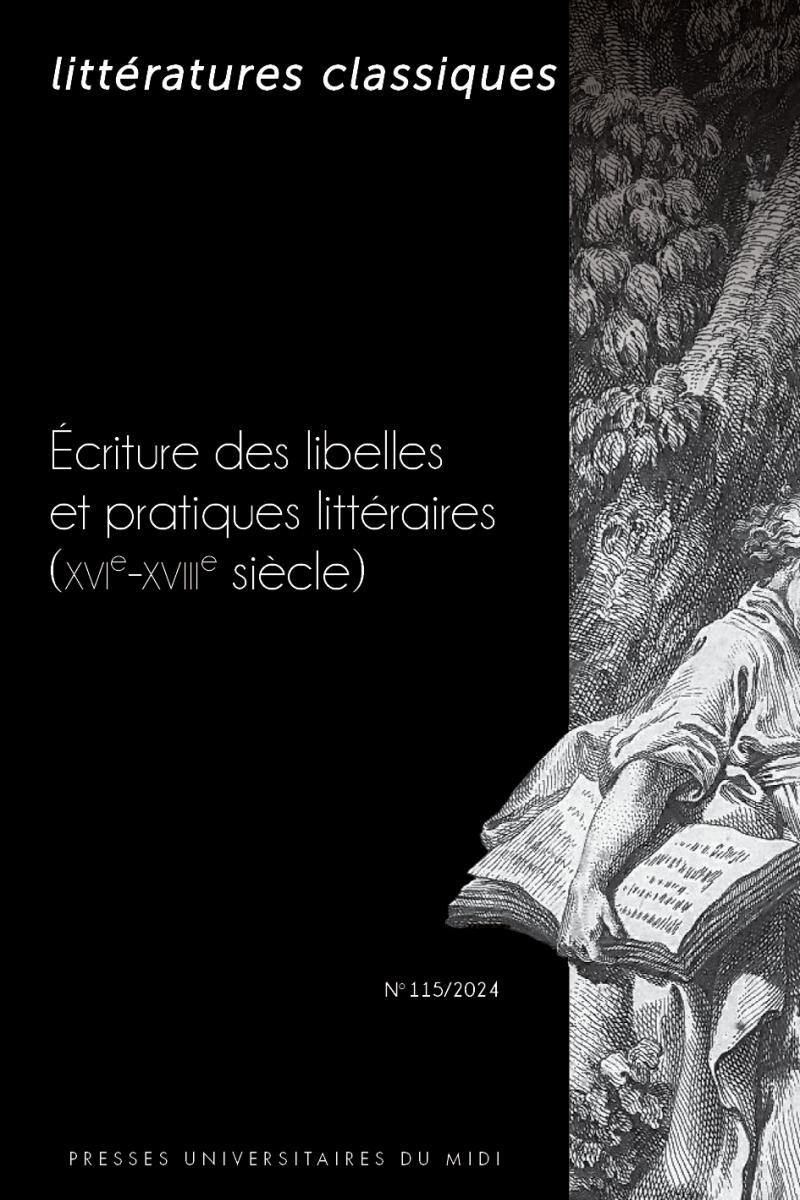 Littératures classiques, n° 115, Karine ABIVEN, Delphine AMSTUTZ, Alexandre GODERNIAUX et Adrienne PETIT (dir.), "Écriture des libelles et pratiques littéraire"
Littératures classiques, n° 115, Karine ABIVEN, Delphine AMSTUTZ, Alexandre GODERNIAUX et Adrienne PETIT (dir.), "Écriture des libelles et pratiques littéraire" La diffusion du théâtre espagnol en France au XVIIe siècle : bilan et perspectives
La diffusion du théâtre espagnol en France au XVIIe siècle : bilan et perspectives